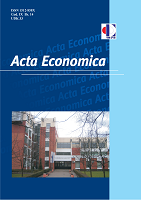МЕЂУУСЛОВЉЕНОСТ ПОЛИТИКЕ ОПОРЕЗИВАЊА И РАЗВОЈА МСП СЕКТОРА: ЕМПИРИЈСКА СТУДИЈА У РЕПУБЛИЦИ СРПСКОЈ
INTERDEPENDENCE BETWEEN TAX POLICY AND DEVELOPMENT OF THE SME SECTOR: AN EMPIRICAL STUDY IN THE REPUBLIC OF SRPSKA
Author(s): Saša Petković, Milica VidovićSubject(s): Business Economy / Management, Economic policy, Economic development, Fiscal Politics / Budgeting
Published by: Економски факултет Универзитета у Бањој Луци
Keywords: small and medium sized enterprises; tax policy; tax reliefs; value added tax; income tax;
Summary/Abstract: Small and medium sized enterprises (SMEs) are increasingly the subject of interest and support of the governments of developed countries in which these businesses are one of the factors that influence the economical development. Many external and internal factors influence on the establishment, operation, growth and development of SMEs. The developed countries of the world put SMEs in the focus of their economic strategies and programs with specific macroeconomic policies measures, such as targeted fiscal policy to SMEs, tax exemptions and special taxation schemes that directly affect the reduction of operating costs, improve liquidity and competitiveness of small and medium-sized businesses. Nevertheless, Bosnia and Herzegovina and the Republic of Srpska, still do not adopt tax policies and practices of many developed countries around the world, so not enough attention is being paid to the improvement of SMEs. The aim of this study is to define the factors in the area of tax policy, which discourage the survival and slow down the growth and development of SMEs. For this purpose, we have implemented quantitative research in the area of 5 cities and 16 municipalities in the Republic of Srpska on the sample of 199 examinees. Based on the results of our empirical study analysis, we came to a conclusion that 93,96% of the sampled SMEs believe that tax compliance is complicated and expensive, while 92,96% believe that tax laws are complex and complicated. That introduction of cash accounting for VAT will contribute to their business through increased turnover and enlarged range of services and products is considered by 83,42% of SMEs. Even 85,93% of the examinees think it would contribute to their business if they had a lower tax rate in the first three years after its establishment, while 69,35% of the examinees believe that the income tax rate is high. Introduction of the quarterly VAT filing is seen as a contribution to their business by 65,33% of the examinees.
Journal: Acta Economica
- Issue Year: 13/2015
- Issue No: 23
- Page Range: 9-45
- Page Count: 37
- Language: Serbian

